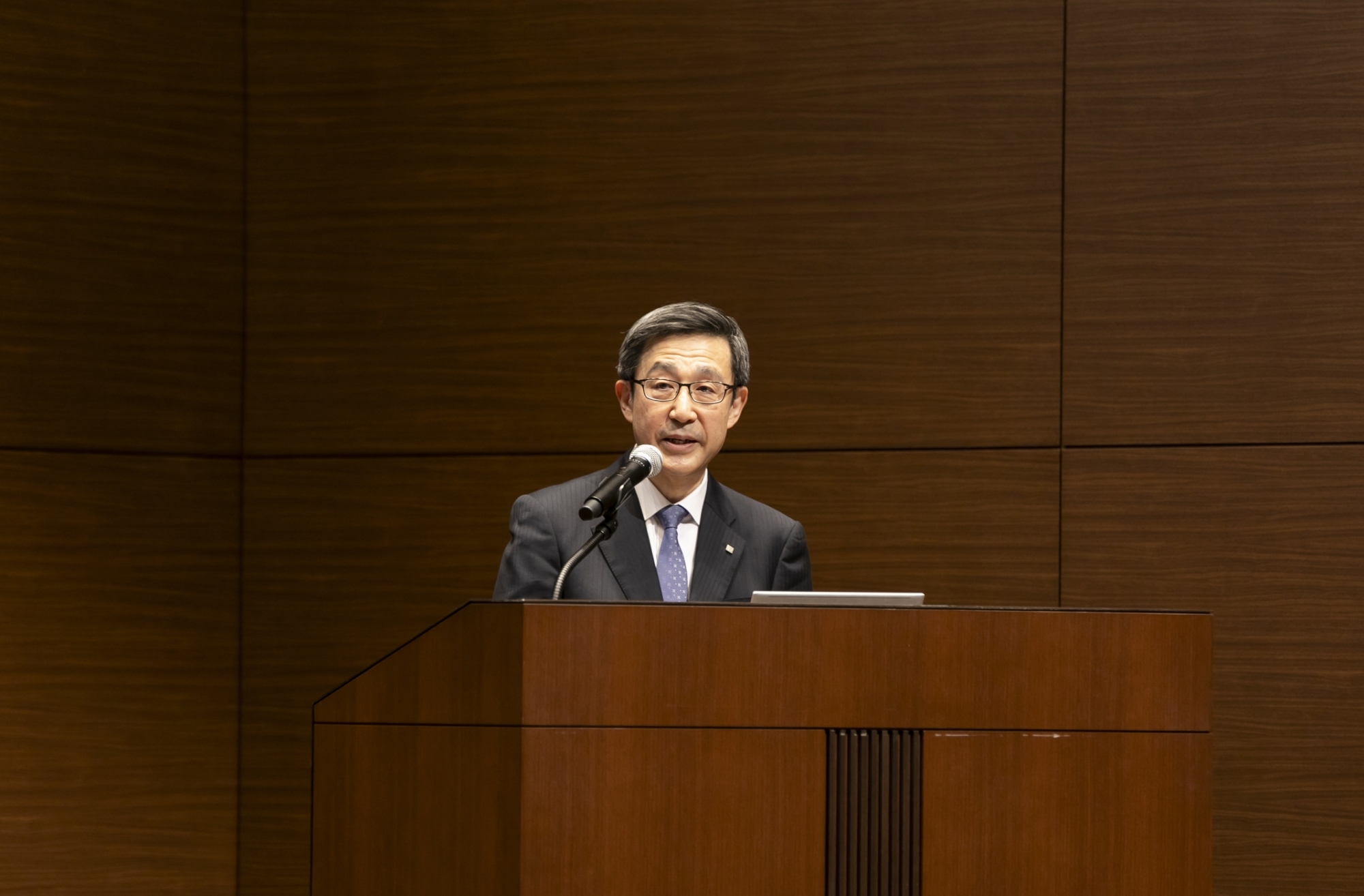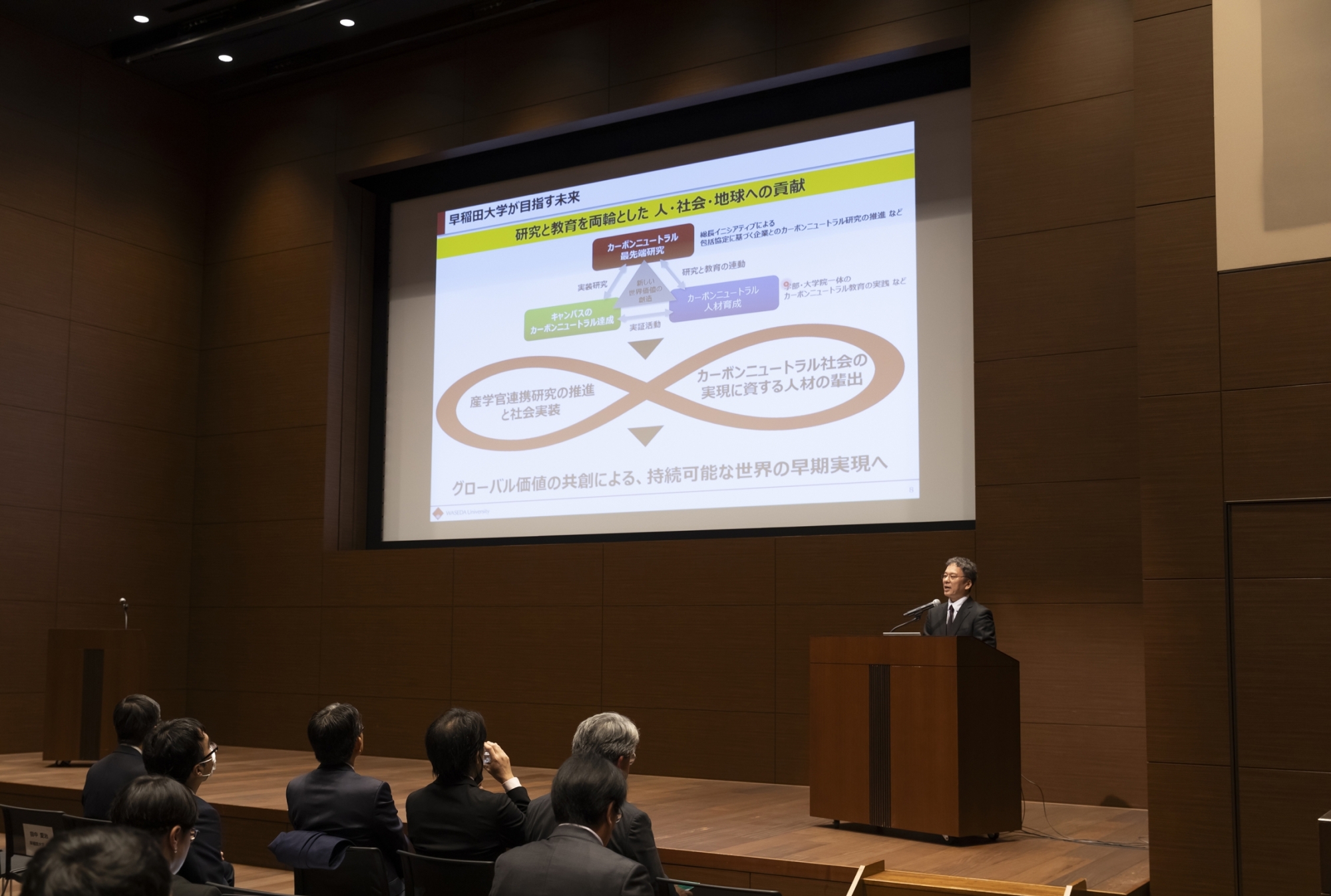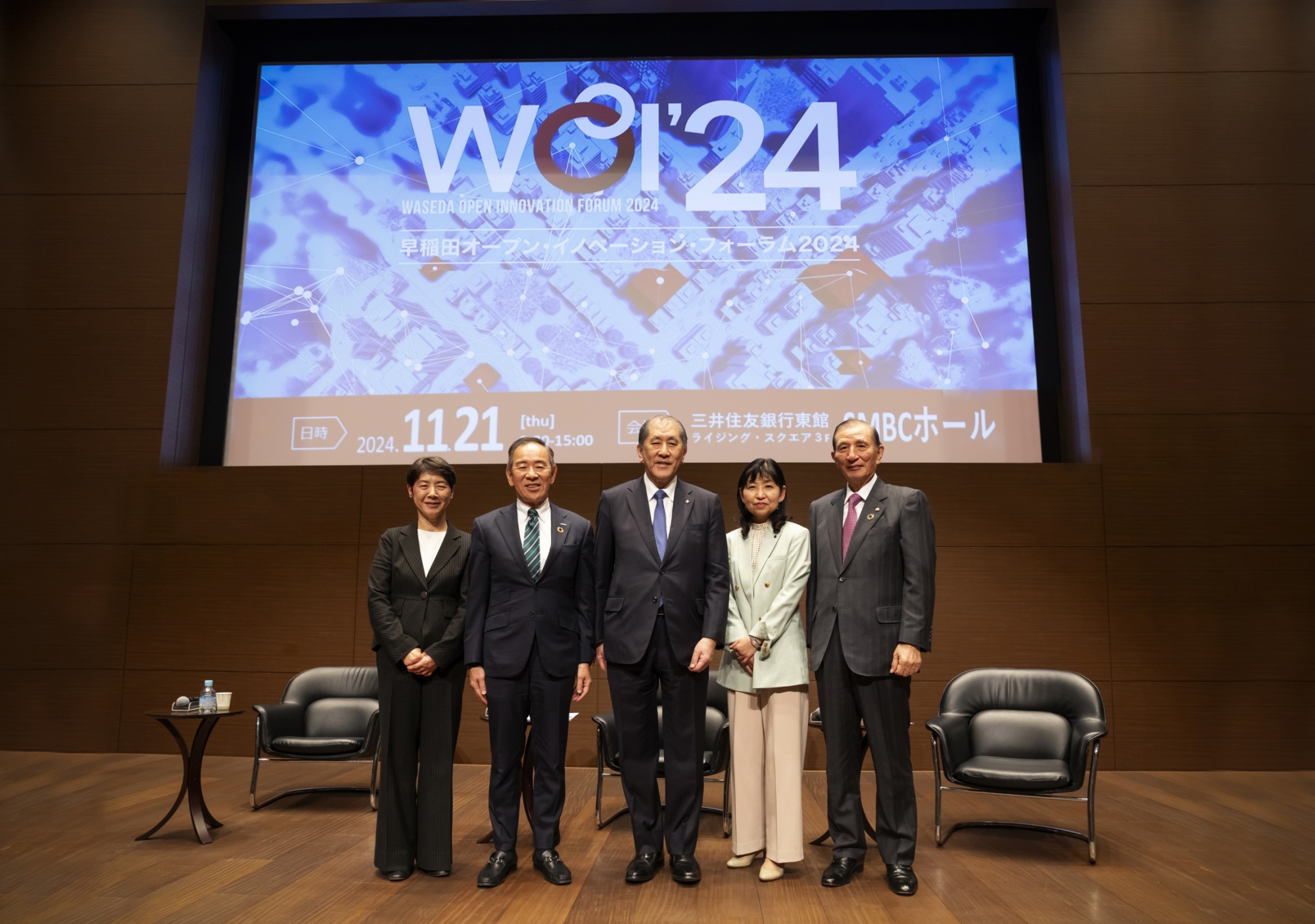The Waseda Open Innovation Forum 2024 Showcases Research Output and Social Impact from Academia-Industry Cooperation
Thu, Dec 12, 2024-
Tags
The Waseda Open Innovation Forum 2024 (WOI’ 24) took place on 21 November at the SMBC Hall of the SMBC East Tower in Tokyo. The WOI’24 was an event organized under the Global Research Center (GRC) initiative led by University President Aiji Tanaka. This forum showcased a range of projects and achievements made possible through Waseda’s academia-industry cooperation and invited various academic and business leaders as guest speakers, providing a platform for them to conduct interdisciplinary and cross-industrial dialogues. Over 1000 in-person and online participants, including researchers, professionals, and practitioners from universities, research institutes, corporations, small and medium-sized enterprises, startups, and ventures, the media, government-affiliated agencies and NGOs and NPOs, and the general public joined together at this event.

Takayuki Homma, Executive Vice President for Academic Affairs, Research Advancement, and Industry-Academia Collaboration, and Vice Provost
In the opening speech, Takayuki Homma, Executive Vice President for Academic Affairs, Research Advancement, and Industry-Academia Collaboration, and Vice Provost introduced the background of the GRC and set the tone of the one-day forum. As part of the lead-up to the 150th anniversary, Waseda has made it our broad mission to contribute to global society. In order to facilitate that broad mission, it has created three global centers (the GRC, the Global Education Center (GEC), and the Global Citizenship Center (GCC)) which encompass the areas of focus: research, education, and contribution. The GRC is positioned to directly address the research aspect and is organized at the intersections of the various faculties of Waseda, cutting across different academic fields. It targets providing solutions to key social problems and achieving global impacts on the international stage. Three important themes of the GRC include global peace, carbon neutral society, and natural disaster recovery and victims’ support. An example of a well-known project is the Waseda Carbon Net Zero Challenge.

“Development of Academia-Industry Cooperation with Top Companies in Electricity, Information Communication, and Construction and Manufacturing” presentations
The opening speech was followed by a series of presentations under the title of “Development of Academia-Industry Cooperation with Top Companies in Electricity, Information Communication, and Construction and Manufacturing.” To begin, Yasuhiro Hayashi, Director of the Waseda Center for a Carbon Neutral Society (WCANS) and professor of the Faculty of Science and Engineering, gave an introduction of the history of Waseda’s carbon neutral initiatives. He introduced the WCANS’s three core activities: carbon neutral research, carbon neutral human development, and carbon neutral campus. Following his introduction, company representatives from Tokyo Electric Power Company Holdings, Mitsubishi Electric Corporation Information Technology R&D Center, Shimizu Corporation NOVARE Innovation Center, and NTT Space Environment and Energy Laboratories each made a presentation, summarizing the key features and outputs of their academia-industry cooperation, reflecting on some challenges along the way as well as the future prospects of their various projects and further cooperation with Waseda. Their presentations showed how bringing university researchers and industry leaders together can create new intellectual properties, develop human capital, and in turn benefit technological progress and social innovation at large.
After the presentations made by the company representatives, a panel discussion under the title of “Contributing to Humanity Through the Convergence of Knowledge” took place. Three professors from Waseda’s Faculty of Science and Engineering and Faculty of Law were joined by the representative from the NPO “YNF”, which is based in the Kyushu area and aims to support those affected by natural disasters in Japan. In particular, they discussed five major practical and inter-connected issues for earthquakes in the Noto Peninsula: the lack of understanding of a variety of policies by the victims and staff, the lack of support staff in the field, damaged houses and the lack of accommodations for the victims, and the challenges in winter such as damaged roads and the piling up of snow. The panelists discussed how AI, robotics, and data can be helpful in addressing these difficult issues and improve the making, implementation, and analysis of policies and contribute to social well-being in general. They emphasized that cooperation among academia, industry, and other organizations can help prevent and reduce the damages of natural disasters.
Then, a poster session during the lunch break was organized to showcase Waseda’s original and innovative research results and introduce university-based startups in various booths to create networking opportunities between Waseda researchers and industry leaders. The exhibited research hailed from a range of Waseda’s affiliated research institutes such as the WCANS, Kagami Memorial Research Institute for Materials Science, Green Computing Systems Research Organization, Future Robotics Organization, Advanced Collaborative Research Organization for Smart Society, Waseda Research Institute for Science and Engineering, Research Institute for Letters, Arts and Sciences, Waseda Institute for Advanced Study, and Comprehensive Research Organization. In the afternoon, President Aiji Tanaka joined a roundtable talk titled the “Waseda Leaders Forum.” Representatives from several companies such as Rapidus Corporation, Asahi Biocycle Co., Tokyu Corporation, and NTTCom Online Marketing Solutions Corporation introduced their business portfolios and models and discussed topics such as business vision, market competition, and social innovation and sustainability.
As a Ph.D. candidate and early-stage researcher in the social sciences who works with survey and text data, this forum showed me, on the one hand, how data and empirical methods can assist in analyzing social issues, and on the other hand, how knowledge and techniques from social, natural, and applied sciences can be combined to suggest and create practical social solutions. I look forward to attending similar events organized by the GRC in the future to see how the GRC will continue to encourage interesting interdisciplinary research and act as a bridge between academia and industry to promote social innovation and tackle ongoing social challenges.
This article was written by the following Student Contributor
Peter Chai (Kai Shibata)
Graduate School of Political Science














